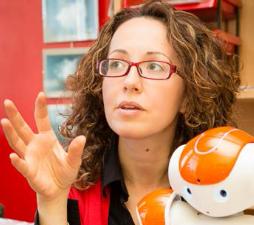 Dr Hatice Gunes is a Senior Lecturer at the Computer Laboratory. She is also the President-Elect of the Association for the Advancement of Affective Computing and the Chair of the Steering Board of IEEE Transactions on Affective Computing.
Dr Hatice Gunes is a Senior Lecturer at the Computer Laboratory. She is also the President-Elect of the Association for the Advancement of Affective Computing and the Chair of the Steering Board of IEEE Transactions on Affective Computing.
Hatice’s research interests are in the areas of affective computing and social signal processing. At the intersection of computer vision, signal processing, machine learning, multimodal interaction and human-robot interaction, her work has contributed to sensing, and continuous prediction and recognition of affect and personality from nonverbal behavioural cues.
Her current research commitment is to embrace the challenges present in the areas of health, and equality and diversity to bring positive behavioural change, and ultimately empower the lives of the world’s poorest 3 billion people through technology – e.g., by integrating behaviour and emotion analysis into Virtual-Reality-based working memory training, and incorporating social robots into daily life in the context of training, coaching and supporting well-being.
Hatice's motivation to contribute to the Sustainable development Goals through Cambridge Global Challenges is well represented by the Science Museum’s new exhibition on the remarkable 500-year history of robots and on the potential insights the robots offer into our human ambitions, desires and position in a rapidly changing world.


